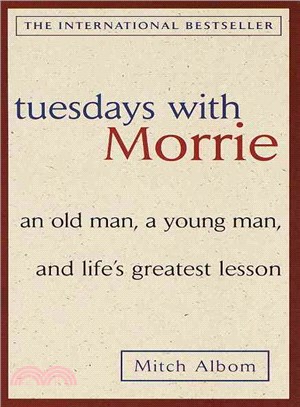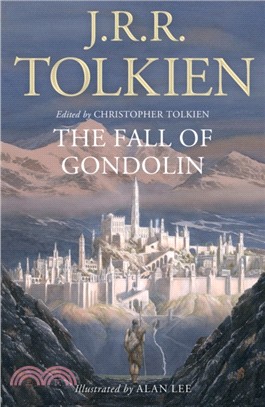Tuesdays with Morrie
商品資訊
ISBN13:9780385496490
替代書名:最後十四堂星期二的課
出版社:Random House US
作者:Mitch Albom
出版日:2001/07/01
裝訂/頁數:平裝/192頁
商品簡介
Maybe it was a grandparent, or a teacher, or a colleague. Someone older, patient and wise, who understood you when you were young and searching, helped you see the world as a more profound place, gave you sound advice to help you make your way through it.
For Mitch Albom, that person was Morrie Schwartz, his college professor from nearly twenty years ago.
Maybe, like Mitch, you lost track of this mentor as you made your way, and the insights faded, and the world seemed colder. Wouldn't you like to see that person again, ask the bigger questions that still haunt you, receive wisdom for your busy life today the way you once did when you were younger?
Mitch Albom had that second chance. He rediscovered Morrie in the last months of the older man's life. Knowing he was dying, Morrie visited with Mitch in his study every Tuesday, just as they used to back in college. Their rekindled relationship turned into one final "class": lessons in how to live.
Tuesdays with Morrie is a magical chronicle of their time together, through which Mitch shares Morrie's lasting gift with the world.
作者簡介
名人/編輯推薦
"This is a sweet book of a man's love for his mentor. It has a stubborn honesty that nourishes the living."
-Robert Bly, author of Iron John
"A deeply moving account of courage and wisdom, shared by an inveterate mentor looking into the multitextured face of his own death. There is much to be learned by sitting in on this final class."
-Jon Kabat-Zinn, coauthor of Everyday Blessings and Wherever You Go, There You Are
"All of the saints and Buddhas have taught us that wisdom and compassion are one. Now along comes Morrie, who makes it perfectly plain. His living and dying show us the way."
-Joanna Bull, Founder and Executive Director of Gilda's Club
書摘/試閱
The last class of my old professor's life took place once a week in his house, by a window in the study where he could watch a small hibiscus plant shed its pink leaves. The class met on Tuesdays. It began after breakfast. The subject was The Meaning of Life. It was taught from experience.
No grades were given, but there were oral exams each week. You were expected to respond to questions, and you were expected to pose questions of your own. You were also required to perform physical tasks now and then, such as lifting the professor's head to a comfortable spot on the pillow or placing his glasses on the bridge of his nose. Kissing him good-bye earned you extra credit.
No books were required, yet many topics were covered, including love, work, community, family, aging, forgiveness, and, finally, death. The last lecture was brief, only a few words.
A funeral was held in lieu of graduation.
Although no final exam was given, you were expected to produce one long paper on what was learned. That paper is presented here.
The last class of my old professor's life had only one student.
I was the student.
It is the late spring of 1979, a hot, sticky Saturday afternoon. Hundreds of us sit together, side by side, in rows of wooden folding chairs on the main campus lawn. We wear blue nylon robes. We listen impatiently to long speeches. When the ceremony is over, we throw our caps in the air, and we are officially graduated from college, the senior class of Brandeis University in the city of Waltham, Massachusetts. For many of us, the curtain has just come down on childhood.
Afterward, I find Morrie Schwartz, my favorite professor, and introduce him to my parents. He is a small man who takes small steps, as if a strong wind could, at any time, whisk him up into the clouds. In his graduation day robe, he looks like a cross between a biblical prophet and a Christmas elf. He has sparkling blue-green eyes, thinning silver hair that spills onto his forehead, big ears, a triangular nose, and tufts of graying eyebrows. Although his teeth are crooked and his lower ones are slanted back-as if someone had once punched them in-when he smiles it's as if you'd just told him the first joke on earth.
He tells my parents how I took every class he taught. He tells them, "You have a special boy here." Embarrassed, I look at my feet. Before we leave, I hand my professor a present, a tan briefcase with his initials on the front. I bought this the day before at a shopping mall. I didn't want to forget him. Maybe I didn't want him to forget me.
"Mitch, you are one of the good ones," he says, admiring the briefcase. Then he hugs me. I feel his thin arms around my back. I am taller than he is, and when he holds me, I feel awkward, older, as if I were the parent and he were the child.
He asks if I will stay in touch, and without hesitation I say, "Of course."
When he steps back, I see that he is crying.
The Syllabus
His death sentence came in the summer of 1994. Looking back, Morrie knew something bad was coming long before that. He knew it the day he gave up dancing.
He had always been a dancer, my old professor. The music didn't matter. Rock and roll, big band, the blues. He loved them all. He would close his eyes and with a blissful smile begin to move to his own sense of rhythm. It wasn't always pretty. But then, he didn't worry about a partner. Morrie danced by himself.
He used to go to this church in Harvard Square every Wednesday night for something called "Dance Free." They had flashing lights and booming speakers and Morrie would wander in among the mostly student crowd, wearing a white T-shirt and black sweatpants and a towel around his neck, and whatever music was playing, that's the music to which he danced. He'd do the lindy to Jimi Hendrix. He twisted and twirled, he waved his arms like a conductor on amphetamines, until sweat was dripping down the middle of his back. No one there knew he was a prominent doctor of sociology, with years of experience as a college professor and several well-respected books. They just thought he was some old nut.
Once, he brought a tango tape and got them to play it over the speakers. Then he commandeered the floor, shooting back and forth like some hot Latin lover. When he finished, everyone applauded. He could have stayed in that moment forever.
But then the dancing stopped.
He developed asthma in his sixties. His breathing became labored. One day he was walking along the Charles River, and a cold burst of wind left him choking for air. He was rushed to the hospital and injected with Adrenalin.
A few years later, he began to have trouble walking. At a birthday party for a friend, he stumbled inexplicably. Another night, he fell down the steps of a theater, startling a small crowd of people.
"Give him air!" someone yelled.
He was in his seventies by this point, so they whispered "old age" and helped him to his feet. But Morrie, who was always more in touch with his insides than the rest of us, knew something else was wrong. This was more than old age. He was weary all the time. He had trouble sleeping. He dreamt he was dying.
He began to see doctors. Lots of them. They tested his blood. They tested his urine. They put a scope up his rear end and looked inside his intestines. Finally, when nothing could be found, one doctor ordered a muscle biopsy, taking a small piece out of Morrie's calf. The lab report came back suggesting a neurological problem, and Morrie was brought in for yet another series of tests. In one of those tests, he sat in a special seat as they zapped him with electrical current-an electric chair, of sorts-and studied his neurological responses.
"We need to check this further," the doctors said, looking over his results.
"Why?" Morrie asked. "What is it?"
"We're not sure. Your times are slow."
His times were slow? What did that mean?
Finally, on a hot, humid day in August 1994, Morrie and his wife, Charlotte, went to the neurologist's office, and he asked them to sit before he broke the news: Morrie had amyotrophic lateral sclerosis (ALS), Lou Gehrig's disease, a brutal, unforgiving illness of the neurological system.
There was no known cure.
"How did I get it?" Morrie asked.
Nobody knew.
"Is it terminal?"
Yes.
"So I'm going to die?"
Yes, you are, the doctor said. I'm very sorry.
He sat with Morrie and Charlotte for nearly two hours, patiently answering their questions. When they left, the doctor gave them some information on ALS, little pamphlets, as if they were opening a bank account. Outside, the sun was shining and people were going about their business. A woman ran to put money in the parking meter. Another carried groceries. Charlotte had a million thoughts running through her mind: How much time do we have left? How will we manage? How will we pay the bills?
My old professor, meanwhile, was stunned by the normalcy of the day around him. Shouldn't the world stop? Don't they know what has happened to me?
But the world did not stop, it took no notice at all, and as Morrie pulled weakly on the car door, he felt as if he were dropping into a hole.
Now what? he thought.
As my old professor searched for answers, the disease took him over, day by day, week by week. He backed the car out of the garage one morning and could barely push the brakes. That was the end of his driving.
He kept tripping, so he purchased a cane. That was the end of his walking free.
He went for his regular swim at the YMCA, but found he could no longer undress himself. So he hired his first home care worker-a theology student named Tony-who helped him in and out of the pool, and in and out of his bathing suit. In the locker room, the other swimmers pretended not to stare. They stared anyhow. That was the end of his privacy.
In the fall of 1994, Morrie came to the hilly Brandeis campus to teach his final college course. He could have skipped this, of course. The university would have understood. Why suffer in front of so many people? Stay at home. Get your affairs in order. But the idea of quitting did not occur to Morrie.
Instead, he hobbled into the classroom, his home for more than thirty years. Because of the cane, he took a while to reach the chair. Finally, he sat down, dropped his glasses off his nose, and looked out at the young faces who stared back in silence.
"My friends, I assume you are all here for the Social Psychology class. I have been teaching this course for twenty years, and this is the first time I can say there is a risk in taking it, because I have a fatal illness. I may not live to finish the semester.
"If you feel this is a problem, I understand if you wish to drop the course."
He smiled.
And that was the end of his secret.
ALS is like a lit candle: it melts your nerves and leaves your body a pile of wax. Often. it begins with the legs and works its way up. You lose control of your thigh muscles, so that you cannot support yourself standing. You lose control of your trunk muscles, so that you cannot sit up straight. By the end, if you are still alive, you are breathing through a tube in a hole in your throat, while your soul, perfectly awake, is imprisoned inside a limp husk, perhaps able to blink, or cluck a tongue, like something from a science fiction movie, the man frozen inside his own flesh. This takes no more than five years from the day you contract the disease.
Morrie's doctors guessed he had two years left.
Morrie knew it was less.
But my old professor had made a profound decision, one he began to construct the day he came out of the doctor's office with a sword hanging over his head. Do I wither up and disappear, or do I make the best of my time left? he had asked himself.
He would not wither. He would not be ashamed of dying.
Instead, he would make death his final project, the center point of his days. Since everyone was going to die, he could be of great value, right? He could be research. A human textbook. Study me in my slow and patient demise. Watch what happens to me. Learn with me.
Morrie would walk that final bridge between life and death, and narrate the trip.
The fall semester passed quickly. The pills increased. Therapy became a regular routine. Nurses came to his house to work with Morrie's withering legs, to keep the muscles active, bending them back and forth as if pumping water from a well. Massage specialists came by once a week to try to soothe the constant, heavy stiffness he felt. He met with meditation teachers, and closed his eyes and narrowed his thoughts until his world shrunk down to a single breath, in and out, in and out.
One day, using his cane, he stepped onto the curb and fell over into the street. The cane was exchanged for a walker. As his body weakened, the back and forth to the bathroom became too exhausting, so Morrie began to urinate into a large beaker. He had to support himself as he did this, meaning someone had to hold the beaker while Morrie filled it.
Most of us would be embarrassed by all this, especially at Morrie's age. But Morrie was not like most of us. When some of his close colleagues would visit, he would say to them, "Listen, I have to pee. Would you mind helping? Are you okay with that?"
Often, to their own surprise, they were.
In fact, he entertained a growing stream of visitors. He had discussion groups about dying, what it really meant, how societies had always been afraid of it without necessarily understanding it. He told his friends that if they really wanted to help him, they would treat him not with sympathy but with visits, phone calls, a sharing of their problems-the way they had always shared their problems, because Morrie had always been a wonderful listener.
For all that was happening to him, his voice was strong and inviting, and his mind was vibrating with a million thoughts. He was intent on proving that the word "dying" was not synonymous with "useless."
The New Year came and went. Although he never said it to anyone, Morrie knew this would be the last year of his life. He was using a wheelchair now, and he was fighting time to say all the things he wanted to say to all the people he loved. When a colleague at Brandeis died suddenly of a heart attack, Morrie went to his funeral. He came home depressed.
"What a waste," he said. "All those people saying all those wonderful things, and Irv never got to hear any of it."
Morrie had a better idea. He made some calls. He chose a date. And on a cold Sunday afternoon, he was joined in his home by a small group of friends and family for a "living funeral." Each of them spoke and paid tribute to my old professor. Some cried. Some laughed. One woman read a poem:
"My dear and loving cousin...
Your ageless heart
as you move through time, layer on layer,
tender sequoia..."
Morrie cried and laughed with them. And all the heartfelt things we never get to say to those we love, Morrie said that day. His "living funeral" was a rousing success.
Only Morrie wasn't dead yet.
In fact, the most unusual part of his life was about to unfold.
主題書展
更多書展今日66折
您曾經瀏覽過的商品
購物須知
外文書商品之書封,為出版社提供之樣本。實際出貨商品,以出版社所提供之現有版本為主。部份書籍,因出版社供應狀況特殊,匯率將依實際狀況做調整。
無庫存之商品,在您完成訂單程序之後,將以空運的方式為你下單調貨。為了縮短等待的時間,建議您將外文書與其他商品分開下單,以獲得最快的取貨速度,平均調貨時間為1~2個月。
為了保護您的權益,「三民網路書店」提供會員七日商品鑑賞期(收到商品為起始日)。
若要辦理退貨,請在商品鑑賞期內寄回,且商品必須是全新狀態與完整包裝(商品、附件、發票、隨貨贈品等)否則恕不接受退貨。
























